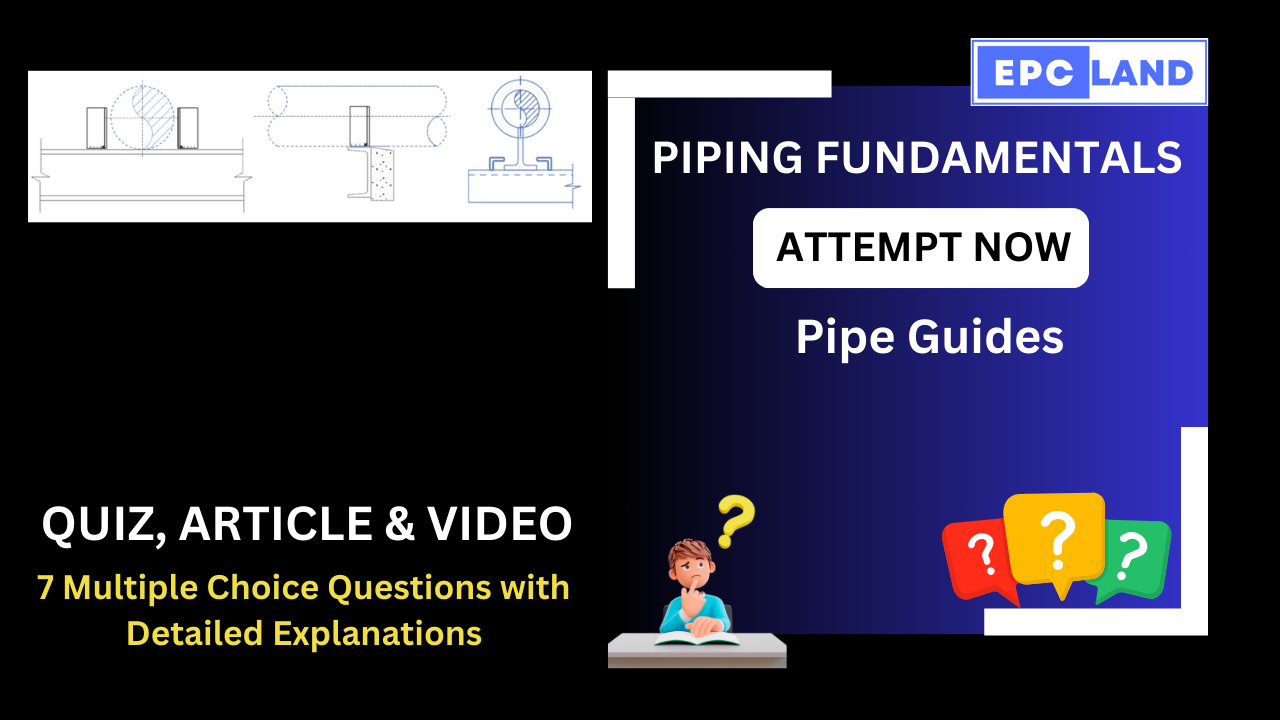
1. Role of Pipe Guides
What is the primary function of pipe guides in a piping system?
Explanation: Pipe guides allow controlled movement in a predetermined direction, crucial for accommodating thermal expansion and preventing stress buildup.
2. Expansion Joint Collaboration
How do pipe guides collaborate with expansion joints in a piping system?
Explanation: Pipe guides collaborate with expansion joints by maintaining proper alignment and preventing excessive stress on the joint, ensuring efficient and safe operation.
3. Role in Maintaining Alignment
How do pipe guides contribute to maintaining the overall alignment of a piping system?
Explanation: Pipe guides prevent lateral movement that could lead to misalignment, ensuring the overall alignment of the piping system.
4. Vertical Control
What is the specific role of pipe guides regarding vertical movement of pipes?
Explanation: Some pipe guides restrict vertical movement to prevent the pipe from sagging or drooping, maintaining proper elevation and preventing potential damage.
5. Ideal Applications for Pipe Guides
In which situations do pipe guides shine and provide the most benefit?
Explanation: Pipe guides shine in situations involving long pipelines with significant thermal expansion and contraction, ensuring controlled movement.
6. Seismic Zone Stability
What role do pipe guides play in areas prone to earthquakes (seismic zones)?
Explanation: Pipe guides provide stability and control pipe movement in areas prone to earthquakes (seismic zones), enhancing overall system reliability.
7. Pipe Guides: Silent Guardians
What role do pipe guides play in the smooth operation and longevity of piping systems?
Explanation: Pipe guides work silently behind the scenes, ensuring proper alignment and functionality for years, making them the unsung heroes of piping systems.
Don’t Miss 20+ Quizzes on Pipe Supports:
Short Article on Pipe Guides: Pipe Supports
Pipe Guides: The Unsung Heroes of Pipe Movement
Pipe guides are the unsung heroes of the piping world, ensuring the proper alignment and movement of pipes within a designated direction. They act like invisible sentinels, guiding the pipe along its intended path while preventing unwanted sideways excursions.
Key Features:
- Movement directors: Unlike anchors that restrict movement entirely, pipe guides allow controlled movement in a predetermined direction. This is crucial for accommodating thermal expansion and contraction, preventing stress buildup and potential pipe damage.
- Expansion joint guardians: Pipe guides are often paired with expansion joints, working in tandem to maintain proper alignment and prevent excessive stress on the joint. They act as a guiding force, ensuring the expansion joint operates efficiently and safely.
- Alignment champions: Pipe guides play a crucial role in maintaining the overall alignment of the piping system. They prevent lateral movement that could lead to misalignment, leaks, and operational issues.
- Vertical control: While allowing longitudinal movement, some pipe guides also restrict vertical movement. This helps to prevent the pipe from sagging or drooping, maintaining proper elevation and preventing potential damage.
Where Pipe Guides Shine:
- Longitudinal lines: Ensuring controlled movement for long pipelines that experience significant thermal expansion and contraction.
- High-temperature systems: Protecting pipes and expansion joints in high-temperature applications where thermal movement is pronounced.
- Pipelines with bends and offsets: Guiding pipes through bends and offsets, preventing misalignment and stress concentration.
- Seismic zones: Providing stability and controlling pipe movement in areas prone to earthquakes.
Pipe Guide: A Silent Guardian for Controlled Movement:
Pipe guides work silently behind the scenes, playing a vital role in the smooth operation and longevity of piping systems. They are the unseen heroes, guiding pipes along the right path and ensuring they stay aligned and functional for years to come. So, the next time you see a pipeline running straight and true, remember the humble pipe guide, the silent guardian working tirelessly to keep everything in line.
Table of Contents
Don’t miss the Course on Effective Isometrics Management: Check Now
Enrollment Link
Recommended courses (Published on EPCLand)
- Complete Course on Piping Engineering
- Basics of Piping Engineering
- Piping Layout Engineering
- Piping Material Engineering
- Piping Stress Analysis
- Material Requisitions
- Piping Material Specifications
- Valve Material Specifications
- Plant Design & Layouts-OISD 118
- Isometric Management
Library of Technical Articles
Don’t miss out the collection of 15+ articles on following topics:
- Basics of Oil and Gas Industry
- Valves
- Testing
- Tank
- Piping Bulk Items
- Pipe
- Metallurgy
- Piping Materials
- Layout
- Instrumentation
- Heat Exchanger
- Type of Contracts
- Codes and Standards
- ASTM Standards
- Articles on Piping Specialty Items
Video details of Complete Course on Piping Engineering
Why Enroll in the EPCLand
Proven Track Record– PTR
Activities & Achievements before launching EPCLand
- Published more than 50+ short courses
- 3000+ Enrolments
- More than 3,500,00 Minutes of watch hours in the last 2 years
- 4000+ Students in 100+ Countries
- Rating of 4+ out of 5
- 1000+ YouTube Videos
- 8K+ Subscribers
What Students will Learn
- Codes & Standards of the Energy Sector
- Piping Material Engineering
- Piping Layout Engineering
- Stress Analysis
Interesting facts
- All the published courses have been developed by Industry Experts with more than 2 decades of experience
- Content is based on Practical experience and real-time problems.
- Content is designed and organized in such a manner that it can be easily grabbed.
- Complete website, Blogs and Quiz sections are Planned, Designed and published by myself (About me: Atul Singla)
- Complete flexibility of Time & Location, Students can access the content from anywhere & anytime
- Moreover, once enrolled, the content can be access as many times as you want, which helps in understand the fundamentals in a better way.
Conclusion
In conclusion, our courses are meticulously crafted by industry experts with over two decades of hands-on experience. The content is rooted in practical knowledge, addressing real-time problems. The material is thoughtfully designed and organized for easy comprehension. Every aspect, from the website to blogs and quizzes, has been planned, designed, and executed by Atul Singla, ensuring a comprehensive and seamless learning experience. With the flexibility of accessing the content at any time and from any location, students have the freedom to learn on their terms. Furthermore, enrollment grants unlimited access, allowing learners to revisit the material as often as needed, fostering a deep understanding of the fundamentals.


